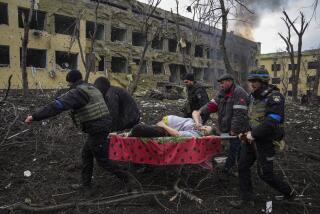THIS IS LONDON <i> by Edward R. Murrow (Schocken: $8.95) </i>
- Share via
Edward R. Murrow’s dispatches from London at the beginning of World War II remain models of concision, 50 years after he delivered them over CBS radio. He summarizes the “hard news” of diplomatic crises and parliamentary debates clearly, but is at his best reporting the human side of the struggle. He talks to people in air-raid shelters during the Blitz, watches firemen battle incendiary bombs, praises the unassuming courage of “Cherry Brandy,” the Dutch prime minister-in-exile and captures the mood of the city in a few pithy sentences. Unlike the inane “sound bites” of contemporary network news, the ideas in these incisive reports are distilled, rather than diluted.
Also available in the “Witness to War” series, marking the 50th anniversary of the outbreak of World War II, is “Orwell: The War Commentaries,” edited by W. J. West (Schocken: $8.95). During the early ‘40s, George Orwell wrote a series of weekly essays on the conflict “as seen through Eastern eyes”--for Indian announcers to read over the BBC to counter Axis propaganda in British India. (Transcriptions of sample broadcasts by the collaborator William Joyce, usually referred to as “Lord Haw-Haw,” are included in an appendix.)
Longer, drier and more detailed, Orwell’s essays lacks the terse immediacy of Murrow’s reports. But his participation in this duplicitous war of words provides an intriguing background to the newspeak disinformation campaigns in “1984.”

